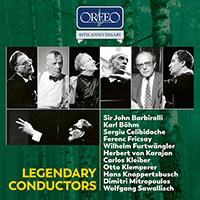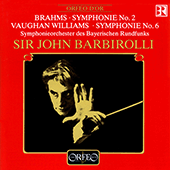
Ralph Vaughan Williams (1872 - 1958)
One of the leading English composers of his generation, Vaughan Williams was a pupil of Parry, Charles Wood and Stanford, and later of Bruch and Ravel. In his work as a composer he went some way towards creating a specifically English musical idiom, influenced by his interest in folksong but coloured by his own personal vision and language.
Stage Works
The stage music of Vaughan Williams includes the Shakespearean opera Sir John in Love (based on The Merry Wives of Windsor), the masque for dancing Job, and the ‘morality’ The Pilgrim’s Progress (after John Bunyan). Incidental music for the theatre includes music for The Wasps by Aristophanes, from which the overture is often heard. He also wrote a number of film scores.
Orchestral Music
Symphonies
Vaughan Williams wrote nine symphonies, the first A Sea Symphony for solo singers, chorus and orchestra (with words taken from Walt Whitman), the second A London Symphony, and the third Pastoral Symphony. The Sixth Symphony, completed in its first version in 1947, seemed to break new ground and was followed by a seventh, the Sinfonia antartica, which had its origin in a film soundtrack.
Concertos
Compositions by Vaughan Williams for solo instrument and orchestra include the pastoral romance The Lark Ascending for solo violin and Concerto accademico for solo violin and string orchestra. There is an attractive oboe concerto and two concertos unusual in their solo instrument: one for harmonica and the other for bass tuba. Flos campi uses a solo viola and is scored also for small choir and chamber orchestra.
Other Orchestral Works
Vaughan Williams made direct use of folksong in, among other works, his three Norfolk Rhapsodies; his Fantasia on Greensleeves for solo flute, harp and strings; and his English Folksong Suite for military band. His Fantasia on a Theme by Thomas Tallis for two string orchestras returns to the 16th century for its musical inspiration.
Choral and Vocal Music
Vaughan Williams made a substantial contribution to English choral and vocal repertoire in compositions that include the fine Serenade to Music, completed in 1938. Other compositions range from hymn tunes to an oratorio, from folksong arrangements to the evocative On Wenlock Edge, a setting of poems by A.E. Housman.
Instrumental Music
Vaughan Williams wrote relatively little chamber music and even less music for piano. His organ pieces, however, provide a few useful repertoire items.
Theatre and Film Music
The incidental music Vaughan Williams provided for the theatre was principally for a series of Shakespearean productions in 1913, when he was musical director at Stratford-upon-Avon for Sir Frank Benson’s company. From 1940 onwards he provided music for a number of films.

















